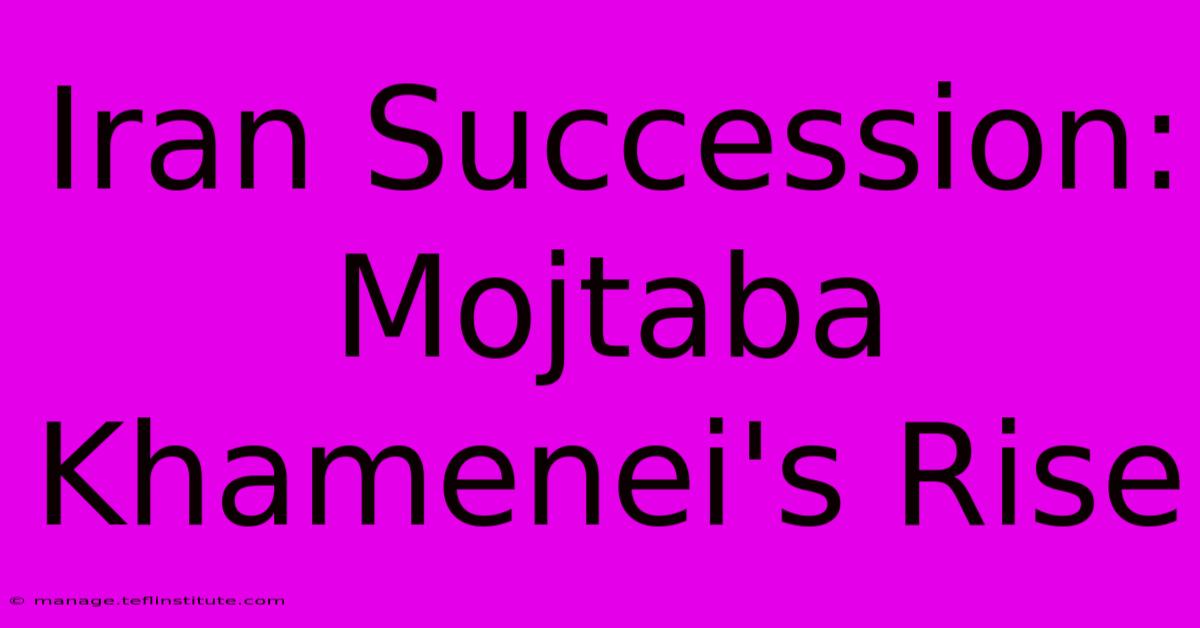Iran Succession: Mojtaba Khamenei's Rise

Table of Contents
Iran Succession: Mojtaba Khamenei's Rise and the Uncertain Future
The question of succession in Iran has long been a source of intense speculation, particularly given the advanced age and declining health of Supreme Leader Ayatollah Ali Khamenei. While no official heir apparent exists, the increasing prominence of his son, Mojtaba Khamenei, has fueled considerable debate and anxiety both within and outside the Islamic Republic. His rise, however, is far from guaranteed, and the path to power remains fraught with challenges.
Mojtaba Khamenei operates largely outside the formal structures of power. Unlike his father, he holds no elected office and lacks the extensive religious credentials typically associated with Supreme Leaders. Yet, his influence is increasingly felt within the clerical establishment and the Revolutionary Guard Corps (IRGC). He is known for his hardline stance, reportedly advocating for even stricter social controls and a more assertive foreign policy. This aligns with a faction within the system resistant to any significant reforms.
Several factors contribute to Mojtaba Khamenei's growing influence:
-
Familial Ties: His relationship to the Supreme Leader is his most significant asset. This provides him with unparalleled access to power networks and decision-making processes. While nepotism is not uncommon in authoritarian regimes, the sheer proximity to the highest office grants him considerable leverage.
-
Cultivation of Networks: Over the years, Mojtaba has carefully cultivated relationships with key figures within the IRGC, the Basij militia, and conservative clerical circles. These networks provide crucial support and facilitate his access to information and influence. He’s reportedly instrumental in shaping personnel decisions and policy recommendations within these influential groups.
-
Control over Information: While not directly holding a public position, reports suggest he plays a significant role in shaping narratives and controlling information flow within the Iranian media. This ability to manage public perception is crucial in shaping public opinion and securing support.
-
Exploiting Existing Power Vacuum: As Ayatollah Khamenei's health deteriorates, a power vacuum inevitably emerges. The absence of a clear successor creates an environment ripe for maneuvering and competition amongst various factions within the Iranian system. Mojtaba has skillfully positioned himself to benefit from this instability.
However, Mojtaba Khamenei's path to succession faces significant obstacles:
-
Lack of Religious Authority: Unlike his father, who held considerable religious authority and scholarship, Mojtaba's religious credentials are relatively weak. This lack of legitimacy could undermine his claim to the Supreme Leader's position within the conservative clerical establishment itself.
-
Resistance from Rival Factions: Not all factions within the Iranian power structure are comfortable with a hereditary succession. Many powerful figures might oppose his elevation, particularly those seeking to advance their own interests or prevent the concentration of power within a single family. Internal power struggles are almost certain to accompany any succession process.
-
Public Opinion: While public opinion is not a deciding factor in the Iranian system, the widespread discontent with the current regime and the potential for social unrest could affect the acceptance of Mojtaba Khamenei as Supreme Leader. His image is far from universally positive, and his ascension could trigger further social instability.
-
External Pressures: International pressure and sanctions could also influence the succession process. The international community's reaction to Mojtaba Khamenei’s potential rise to power could affect the internal dynamics of the Iranian political landscape.
In conclusion, while Mojtaba Khamenei's growing influence is undeniable, his succession is far from guaranteed. The intricate power dynamics within Iran, the lack of clear institutional mechanisms for succession, and the potential for internal resistance and external pressure create a highly uncertain future for the Islamic Republic. The coming years will be critical in determining whether Mojtaba Khamenei can successfully navigate these challenges and claim the mantle of Supreme Leader, or if a different figure will emerge to lead Iran into a new era.

Thank you for visiting our website wich cover about Iran Succession: Mojtaba Khamenei's Rise. We hope the information provided has been useful to you. Feel free to contact us if you have any questions or need further assistance. See you next time and dont miss to bookmark.
Featured Posts
-
Tulisa Confesses Hellish Past
Nov 18, 2024
-
Snake Frightens Danny Jones I M A Celeb
Nov 18, 2024
-
I M A Celeb Barrys Podcast Regret
Nov 18, 2024
-
Roy Keane On Daughters Shocking Response
Nov 18, 2024
Latest Posts
-
Ant Dec Tease Celeb Twist
Nov 18, 2024
-
Babatundes I M A Celeb Winner Pick
Nov 18, 2024
-
Aleshes I M A Celeb Winner Prediction Odoom
Nov 18, 2024
-
Odoom I M A Celeb Winner Aleshe Says Yes
Nov 18, 2024
-
I M A Celeb Aleshe Backs Odoom To Win
Nov 18, 2024
-
Ant And Dec I M A Celeb Curveball
Nov 18, 2024
